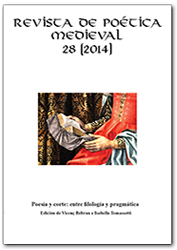«Pragmática poética: estudiando el Romançe por la sennora Reyna de aragon (ID 0613)»
DOI:
https://doi.org/10.37536/RPM.2014.28.0.53192Resumen
Resumen: El Romancero cortés abarca una serie limitada de textos romanceriles conservados en cancioneros compilados en las cortes hispánicas del siglo xv y albores del siglo xvi, representativos de una actividad poética cuya oralidad culta no llegó siempre a dejar una huella escrita. La originalidad de dichos textos, nacidos en un cruce de circunstancias históricas, literarias y culturales hasta cierto punto identi - cables, exige que se les aplique una verdadera pragmática poética, con el n de no incurrir en una lectura reductora. El «Romançe por la sennora Reyna de aragon» (ID 0613), partícipe de una serie poética de cuatro textos, invita a considerar el contexto histórico en que fue compuesto y posteriormente transcrito, pero también la innegable presencia del legado cortés de los trovadores. La pragmática poética nos invita entonces a combinar contextos con la esperanza de llegar a entender mejor la complejidad de una práctica poética noticiera, cortés y, en n, plenamente cortesana.
Palabras clave: Cancioneros. Romançe por la sennora Reyna de aragon. María de Aragón. Carvajal. Corte napolitana de Alfonso V de Aragón.
Abstract: The courtly Romancero gathers a limited serie of romanceriles texts pre- served in cancioneros which have been collected in fteenth and early sixteenth century Spanish courts, as representants of a genuine and oral poetic activity with no need to exist in a written way. The originality of these texts, born in the middle of historic, literary and cultural circumstances, partly identi able, can’t be properly stu- died without a poetic pragmatica, in order to avoid any kind of partial interpretation. The «Romançe por la sennora Reyna de aragon» (ID 0613) is part of a four texts poetic series and invites to pay attention to the historic context which surrounded his composition and later transcription, and also the indeniable testimony of trouba- dours courtly legacy. The poetic pragmatica leads us to associate contexts, in order to fully understand the complexity of this poetic practice as an actual part of history, courtly love and aristocratic way of life.
Keywords: Cancioneros. Romançe por la sennora Reyna de aragon. María of Aragon. Carvajal. Napolitan court of Alfonso v of Aragon.
Descargas
Métricas alternativas
Descargas
Cómo citar
Número
Sección
Licencia
Las opiniones y hechos consignados en cada artículo son de exclusiva responsabilidad de sus autores. La Universidad de Alcalá no se hace responsable, en ningún caso, de la credibilidad y autenticidad de los trabajos.
Los autores conservan los derechos sobre sus trabajos, aunque ceden de forma no exclusiva los derechos de explotación (reproducción, edición, distribución, comunicación pública y exhibición) a la revista. Los autores son, por lo tanto, libres de hacer acuerdos contractuales adicionales independientes para la distribución no exclusiva de la versión de la obra publicada en la revista (por ejemplo, alojarlo en un repositorio institucional o publicarlo en un libro), siempre que medie un reconocimiento de su publicación inicial en esta revista.
Los trabajos se publican bajo los términos estipulados en la Licencia de Atribución-NoComercial-CompartirIgual 4.0 Internacional Creative Commons (CC BY-NC-SA 4.0) que permite a terceros compartir la obra bajo las siguientes condiciones:
Atribución — Usted debe dar crédito de manera adecuada, brindar un enlace a la licencia, e indicar si se han realizado cambios. Puede hacerlo en cualquier forma razonable, pero no de forma tal que sugiera que usted o su uso tienen el apoyo de la licenciante.
NoComercial — Usted no puede hacer uso del material con propósitos comerciales.
CompartirIgual — Si remezcla, transforma o crea a partir del material, debe distribuir su contribución bajo la misma licencia del original.










